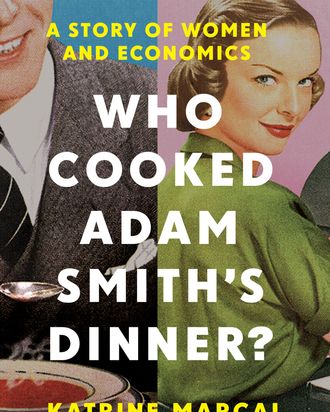
Chances are, unless you’re one of those people who thrives on staying up all night trawling Wikipedia, you do not know who Margaret Douglas is. It’s more likely you’ve heard of her son, the Scottish philosopher Adam Smith, whose Wealth of Nations is largely considered to be the foundation for our modern-day understanding of world economics. Adam Smith has a permanent entry in world history. Margaret Douglas does not. Adam Smith developed the idea of the success of self-interest in the free market. Margaret Douglas cooked his dinner. Margaret Douglas may have been forgotten by history, but Adam Smith would not have existed without her.
Last week, Swedish journalist Katrine Marçal’s book Who Cooked Adam’s Smith’s Dinner? was released in the U.S. after a year in print in Europe. The goal of her book is to topple Adam Smith’s idea of the “economic man,” which he summed up in Wealth of Nations with the quote, “It is not from the benevolence of the butcher, the brewer, or the baker that we expect our dinner, but from their regard to their own interest.” But that formulation does not work, Marçal argues, without the tireless invisible labor of the other half of the world: women.
“When the market is allowed to operate freely the economy will run like clockwork, ticking away on an unlimited supply of self-interest, he reasoned,” Marçal writes of Smith. “With everyone working to serve themselves, everyone will have access to the goods they need. The bread is there on the shelf, electricity runs through the wires. And you get your dinner.” But Smith’s dinner — and most of his needs — were taken care of by Douglas for the majority of his life. “Women are almost entirely absent from Adam Smith’s thinking,” Marçal says, but they were not absent from his life. Men have only been able to act in self-interest because there have been women taking care of the children, taking on the housework, providing free labor. Smith was entirely dependent on his mother until her death, and then on his cousin Janet. Marçal’s book attempts to correct this narrative by proving that the “economic man” is not whole.
“I think we feminists are very good at criticizing the media, and beauty ideals, etc., but feminists are not present in the debate that goes on about financial regulation and banking,” Marçal told the Cut on the phone last week. “I think we really need feminists in those discussions, not just because that’s necessary to advance the position of women in the global economy, but also because I think the feminist perspective is absolutely crucial in order to fix the financial mess we’re in.”
The mess Marçal is talking about — the 2008 global financial crisis — is what inspired her to write the book. “My book is about saying, ‘Hey, there’s a fundamental mistake in the way we do economics.’” And if more women don’t begin to think about our position in the economic structure, she argues, the world will continue to leave us out of all industries and manners of life. “It’s only woman who has a gender,” she writes. “Man is human. Only one sex exists. The other is variable, a reflection, complementary.” Marçal’s book takes on a serious topic, women’s participation in the economy, but manages to make it humorous and relatable. It merely demands that we start to think about the systems we rely on and how we can take part in them in the future.
Many men have responded negatively to her argument that the idea of “self-interest” is only half-baked. “Male economists, many of them, get very, very upset,” she told me. “Economics is like a religion to a certain kind of person, especially male economists. (And unfortunately most economists are still men.) Anybody who is stepping up to challenge that, it’s traumatic for them.” When Marçal spoke at the London School of Economics after her book was released in Europe, “a lot of the audience did not like what I said,” she recalled.
As Melinda Gates has argued, getting more feminists involved data-driven fields like economics and statistics could make a big difference in efforts toward equality. Without data on the hours of unpaid domestic work women do, we can’t figure out a better system. Quantifying the price of care work, creating a system that respects pregnancy and child-rearing and shifting the balance of labor so that men and women take part equally are all tangible measures that could pay huge dividends for women around the world.
“There are young women in the U.S. who are very interested in feminism but perhaps don’t naturally pick up the Wall Street Journal and read about banking regulation, and also feel a bit scared by economics and the terminology and men on the television saying things like ‘quantitative easing,’” Marçal says. “I hope that they read the book and feel empowered to learn more. There’s no society, not even Sweden, that has found a solution to this inherent conflict between working on the labor market and the work that needs to be done in the home”
In the short term, she sees one step that could make a huge difference for gender equality in the U.S.: “If you get a female president, which we all hope you do,” Marcal says, laughing, “people in the U.S. will see the presidency or power differently when it comes to gender. And that does matter. In that way, more than the policies will change, the perceptions will change.”




